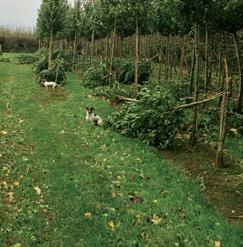
7 minute read
HOW GREEN IS YOUR BUSINESS?
John Murphy, respected nurseryman and owner of Annaveigh Plants, reflects on his business practices in light of growing climate change concerns
Having sat watching the Climate Change Strike on the news last week and being impressed by the numbers turning out here in Ireland and all over the world, I began to contemplate how green we really are. I have always been under the illusion that growing 100 acres of trees offsets the non-green elements of my business, but does it really?
Advertisement
Looking at a few facts and figures, my nursery offsets the carbon emissions of 6.1 return flights from Dublin to
Schiphol, Amsterdam every year. A typical return trip from
Dublin to Tipperary with an HGV emits approximately 250kg of Co2. Looking at these figures, our poor 100 acres of trees would have to work hard just to cover our transport and that excludes all the machinery we operate on the nursery.
Climate change has certainly had an impact on nurseries in
Europe and this was clear to see in the last five years. Freezing temperatures, flooding and shoring temperatures have been a recent feature for Dutch and German producers. Twenty years ago, we would never have contemplated irrigating the trees on the nursery, but now we lay irrigation at the time of planting. Rainfall in Ireland is predicted to fall by 5-15% and there is the unpredictability of extreme weather events, which it is suggested will increase in frequency. It has been very noticeable that certain tree varieties have performed better in the changing climate, Liquidamber and Acer rubrum varieties now thrive in Tipperary, while in the past they struggled. But look around and you will see old Fagus trees in trouble this season due to last year’s drought and this year's soil moisture deficits of up to 40mm.
As a member of the green industry, I am sure you comfort yourself with the belief that: ‘I am planting enough trees and shrubs to offset my carbon footprint’. But I think if you analyse your business you will discover that you are not as green as you thought.
A quick look at ourselves here in Annaveigh shows we are dispatching a lot of non-recyclable plastic yearly. In the form of pots, bags and plastic wrap. Demand has dictated that most wholesale Irish nurseries import plants from Europe, and we are no different. Once you go down this path you must include container shipping, road haulage and the associated unloading and loading operations and adding all the machinery operated on the nursery, and it doesn’t paint a good picture.
While altogether combating Climate Change seems impossible for a small business, there are many changes we can implement immediately. It may not be as dramatic as replacing container ships with electric ships but let’s consider a few options.
Immediately we should look at getting rid of all single-use plastic products. Last Christmas we bought all employees Chilly Bottles and asked staff to stop using single-use water bottles. Another change we implement is the investment in electric alternatives to the traditionally used petrol-powered handheld machinery. Small beginnings.
At present we are looking at ways of replacing the thousands of black plastic bags used on bare-root plants, to date we have not found a suitable replacement. Maybe nurseries who bag their bare-root plants should be asking their customers if this extra packaging is really necessary.


Another area we are actively pursuing is the use of electric/ hybrid vehicles. In 2020 we intend to replace one of our diesel platforms with a completely electric platform from Damcon. Having recently been at a nursery machine show in Germany, I was disappointed at the level of advances in the area of electric machinery. However, we are choosing to focus on areas where options are available. For example, beginning to replace our fleet of diesel vans with electric hybrids.
Two years ago, when we took a bulk delivery of fertiliser for the year, I could not get over the volume when it was all in one place. Fertiliser production is a huge contributor to Co2. Conveniently this realisation coincided with a Teagasc conference featuring a section on fertigation. This method delivers fertiliser where and when the plant needs it, significantly reducing the waste of granular fertiliser. This season we ran our first tests using this method and as a result, all our 2020 planting will use fertigation from the start.
It is now recognised that having bare soil contributes to higher Co2 emissions and all open field nurseries should be sowing catch crops where possible. Once the trees have been lifted we sow crops such as marigolds, Phacelia, wildflower and leafy Turnip. This catches the nitrates leftover from the tree production and the carbon the crop stores is incorporated into the soil as organic matter.
Working in a relatively small market Irish growers can never grow 100% of the plants demanded. If I was to try and grow every tree we are asked for in the multiple of sizes we would have half of Tipperary under trees and we would be broke. Many Irish nurseries are therefore plant importers and once shipping is added to the equation, carbon footprint calculations go out the window. We started looking at this about three years ago and approached a number of Irish nurseries about growing for us on contract. While some were reluctant we have managed to set up three contracts with different nurseries. We calculate that this will reduce our imports by approximately 40% in 2020 and we hope to add to this by 2021. Apart from reducing the carbon miles on the plants, it also means we are supplying plants grown in Ireland with the associated economic benefits.
Unfortunately, many of the changes that need to be made in our industry will not happen unless the situation is forced upon us, something that is obvious in the area of chemical weed control. At the recent Nursery Technique Show in Germany, it was evident how chemical withdrawal has pushed the area of mechanical weed control to the forefront. Our weed control regime has always been based on contact and residual herbicides. As of this season, EU regulation has banned the basis of our entire weed control program, thus forcing us into the purchase of a mechanical finger weeder.
On the same trip, I was staying in the suburbs of Hamburg where chemical weed control by anybody, including landscape contractors and local authorities is completely banned. The result was some areas looked like a wilderness, something we may have to get used too (see photo one). Other areas, like the local shopping centre, was pristinely maintained. This was achieved by planting with ground cover nursery stock (not perennials) that suppressed the weeds and through the use of the many mechanical machines now available to keep kerbs and paving free from weeds. It was another clear example of how horticulture can adapt when regulation forces it to do so.
On a broader scale, we need to look at several areas. The plastic pot issue, it doesn’t matter if they are recyclable or not as it is clear to see that a recyclable product is as likely to end up in the sea as it is in a recycling centre and our industry uses millions of plastic pots each year. I believe that coloured pots are recyclable and if this is the case, we should be switching over immediately from black. Also just released are Taupe plastic pots, these are carbon black free polypropylene that can be recognised by near-infrared in recycling centres, not like black pots. But for this to work we all need to buy into it, no point in a landscaper taking deliveries from Taupe and black pot using nurseries and ending up with a mixed upload of pots. Generally, the taupe pot (and any ‘accredited’ non-carbon black pigment pot) is around 25%-30% more expensive to buy. However, this translates into an average of about 1.5%-2% more on the end-user price for each plant. As an industry, we need to encourage the use of Taupe pots or similar by persuading Local Authorities and Landscape Architects to add their use to any public or private tender.
So to conclude, while thinking about writing this piece I spent a day examining everything I came in contact with on the nursery. If it involved plastics or Co2 emissions I counted it and came up with 26 incidents, 12 of these could be addressed immediately with a little investment. One example is to change our plastic tying material to an organic-based tie. We have started experimenting in the last 2 weeks and this could replace at least 1000 km of plastic.
I would suggest that we all take some time out to look at our business with Climate Change in mind and not let down the millions of young people protesting last week. ✽
PHOTOS LEFT TO RIGHT:
1. SOME OF THE DAMAGE FROM STORM OPHELIA 2. A CHEMICAL-FREE LANDSCAPE IN HAMBURG 3: SPECIAL BIOFUMIGATION MIX WE USE AS A CATCH CROP
JOHN MURPHY - owner and
operator of Annaveigh Plants is one of Ireland’s most experienced and respected nurserymen. For more information visit www.annaveigh.com











